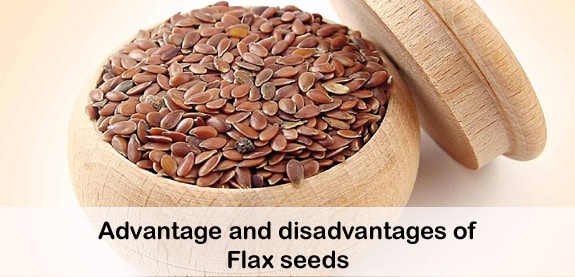This has been many years Flax seeds being consumed. Flax seeds benefits could help you improve digestion, gives you clear smooth skin, lower the cholesterol, reduce sugar craving, balance hormones, fight cancer and promote weight loss and that is just the few of them, flax sees benefits are more than that.
There are two type of flax seed one is small brown seeds and another is golden colored seeds that are rich source of plant-base omega-3 fatty acids Alpha-Linolenic acid (ALA). Another, flax seed are good source of lignans in human diets.
Flaxseed Nutrition Facts
A 1 ounce (3 tbsp) serving of flaxseeds contains:
- Omega-3 (ALA) 6,338mg
- Fiber 8g
- Protein 6g
- Vitamin B1 31% RDA
- Manganese 35% RDA
- Magnesium 30% RDA
- Phosphorus 19% RDA
- Selenium 10% RDA
- Also, flaxseeds contain a good amount of vitamin B6, Iron, potassium, copper and zinc.
This flax seed nutrition profile makes it easy to see why it’s one of the most nutrient dense foods on the planet.
Advantage of Flax seeds:
- High Fiber ad Low in Carbs : Flax is extremely high in both soluble and insoluble fiber which can support colon detoxification, fat loss and reduce sugar cravings.
- Healthy Skin and Hairs: If you want healthier skin, hair and nails then consider adding 2 tbsp of flax seeds to your smoothie or 1 tbsp of flax seed oil to your daily routine. The ALA fats in flax seeds benefits the skin and hair by providing essential fats as well as b-vitamins which can help reduce dryness and flakiness. It can also improve symptoms of acne, rosacea, and eczema. This also applies to eye health as flax can reduce dry eye syndrome.
- Weight loss : flax is full of healthy fats and fiber, it will help you feel satisfied longer so you will eat fewer calories overall which may lead to weight loss. ALA fats may also help reduce inflammation. This is important for weight loss in that an inflamed body will tend to hold on to excess weight. Add a couple of teaspoons of ground flaxseed to soups, salads, or smoothies as part of your weight loss plan.
- Lower the cholesterol: The journal of Nutrition and Metabolism found that adding flax seeds into your diet can naturally reduce cholesterol levels.
- Better digestion : The ALA in flax can help protect the lining of the digestive tract and maintain GI health. It has been shown to be beneficial for people suffering from Crohn’s disease or other digestive ailments, as it can help reduce gut inflammation.
- Treating Cancer : A study published in the Journal of Clinical Cancer Research discovered that consuming flax seeds may decrease the risk of breast cancer. The three lignans found in flaxseeds can be converted by intestinal bacteria into enterolactone and enterodiol which naturally balance hormones which may be the reason flax seeds reduce the risk of breast cancer.
- High in Antioxidants (Lignans): Lignans are unique fiber-related polyphenols that provide us with antioxidant benefits for anti-aging, hormone balance and cellular health. Lignans are also known for their anti-viral and antibacterial properties; therefore consuming flax regularly may help reduce the number or severity of colds and flus.
- Blood Sugar Management : Flaxseed can play an important role in managing blood sugar levels and improving blood sugar control. A thorough review of multiple studies illustrated that the inclusion of whole flaxseed in your regular meal may lead to a reduction in blood sugar levels and help shield insulin resistance, a condition that weakens the body’s capability to efficiently regulate blood sugar levels.
Such a positive impact on blood sugar regulation is foremostly attributed to flaxseed’s rich soluble fiber content. Studies signify that soluble fiber possesses the capacity to delay down the absorption of sugar into the bloodstream, potentially leading to lower blood sugar levels.
Consequently, individuals possessing type 2 diabetes may consider flaxseed significantly beneficial in controlling their blood sugar levels. It’s worth understanding that these advantages are more marked with whole flaxseed when compared to flaxseed oil, as the oil is deficient in the fiber component. - Blood Pressure Reduction : Flaxseed is well-regarded for its capability to decrease blood pressure levels. A comprehensive evaluation of multiple studies revealed that the supplementation of flaxseed products, involving flaxseed powder, can result in a consequential reduction in both the systolic and diastolic blood pressure levels—the top and bottom numbers on a blood pressure reading, respectively.
Remarkably, flaxseed may be significantly effective for individuals with the rise in blood pressure. A 3 month study demonstrated that a daily consumption of 4 tablespoons of about 30 grams of flaxseed lead to lowered blood pressure levels in those with high blood pressure.
Moreover, a substantial review of several studies found that intake of flaxseed on a daily basis for more than three months may result in a reduction of 2 mmHg in blood pressure levels. However, such reduction might seem minor, studies suggest that a 2 mmHg drop can minimize the risk of stroke and coronary heart disease by 14% and 6%, respectively.
Disadvantage of having Flax Seeds:
- May Induce Loose Stools: The presence of high amount of fiber in flax seeds, provides it a laxative property. When used in excessive quantities, this can actually trigger abdominal discomfort, increasing the frequency and count of your bowel movements.
- Delay Clotting Time: Excessive use of flax seed can impair the clotting of blood. The clotting happens, but the time taken will be quite long. It is also known to trigger conditions, such as vomiting with blood and blood in stool.
- Can lead to intense constipation: People suffering from scleroderma should also avoid these Omega 3-rich foods as they can result in intense constipation. This, in turn, causes an obstruction in the bowel movement, worsening the condition.
- Increases Risk Of Macular Degeneration: Studies suggest that high consumption of flax seed could put you at a higher risk of macular degeneration. This is actually due to the ingestion of alpha linoleic acid in excessive amounts.
- Not Safe During Pregnancy Or for women trying to conceive : Studies have proven that the hormonal varying property of these supplements can induce menstrual cycle, affecting the mom and baby in an unanticipated harmful way.
- Studies suggest that using flax seeds could elevate blood sugar level. So, if you are diabetic, stay away from these Omega 3 supplements.
- People using blood thinning medications or those who are suffering from bleeding disorders should stay away from flax seeds as studies suggest a negative interaction between the two.
Flax seeds are good enough if you take it consciously and do not over dose more than 2 table spoon a day. If you overdose or take is wrong way you are likely to experience bad impacts of Flax sees.






 WhatsApp us
WhatsApp us
Naveen m...